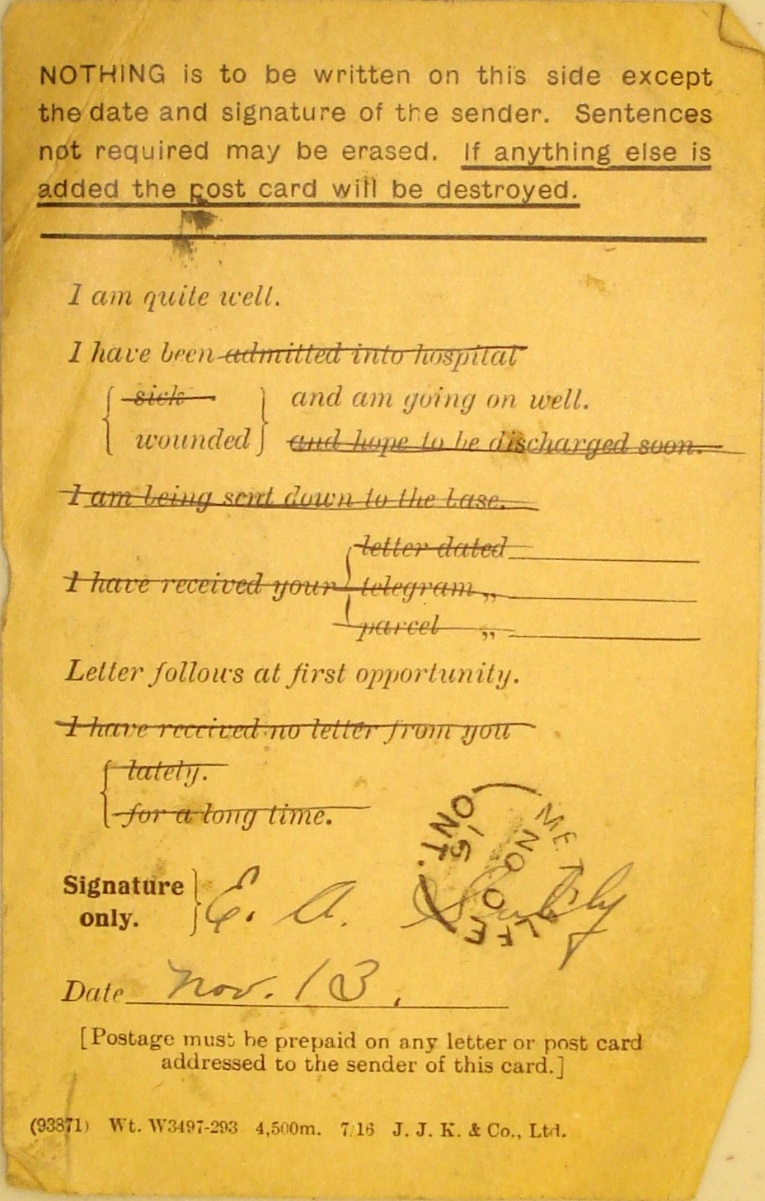Letter 1916-08-27
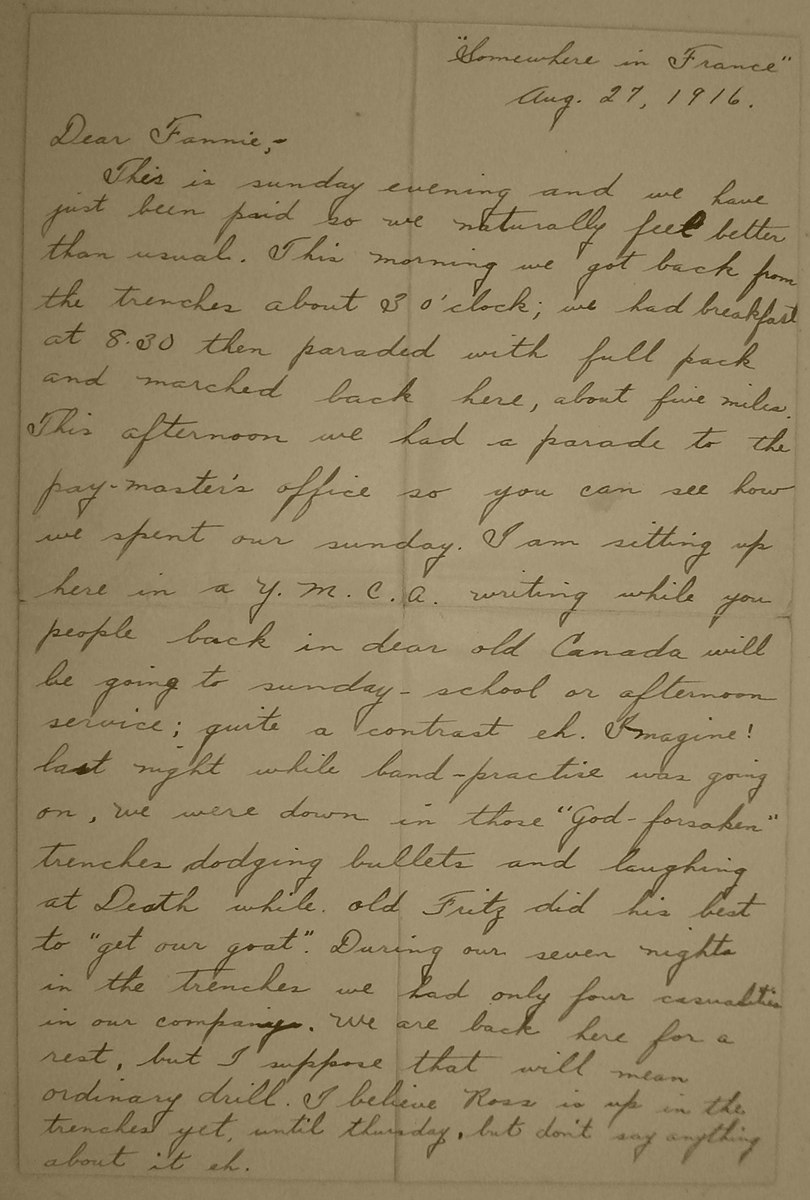
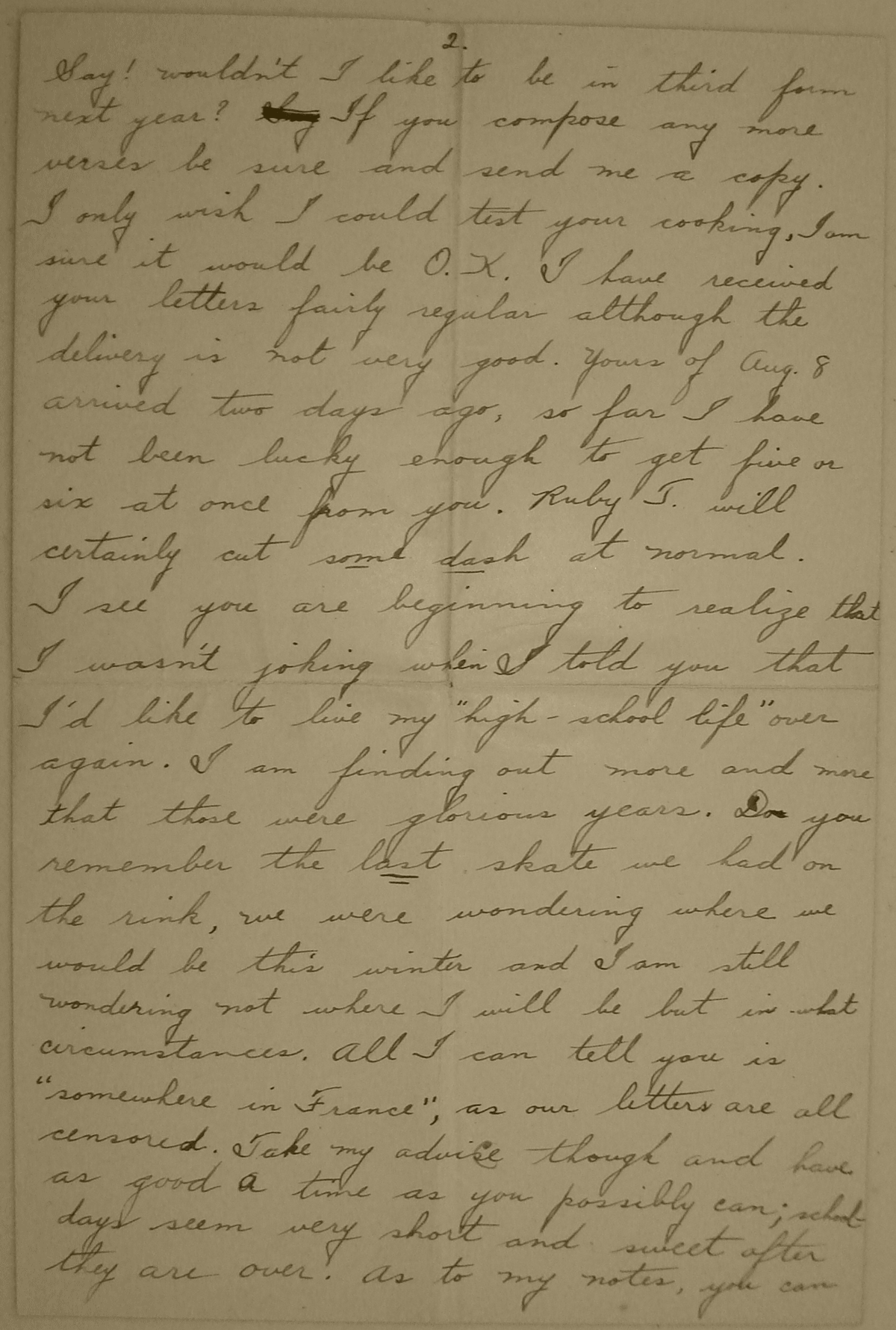
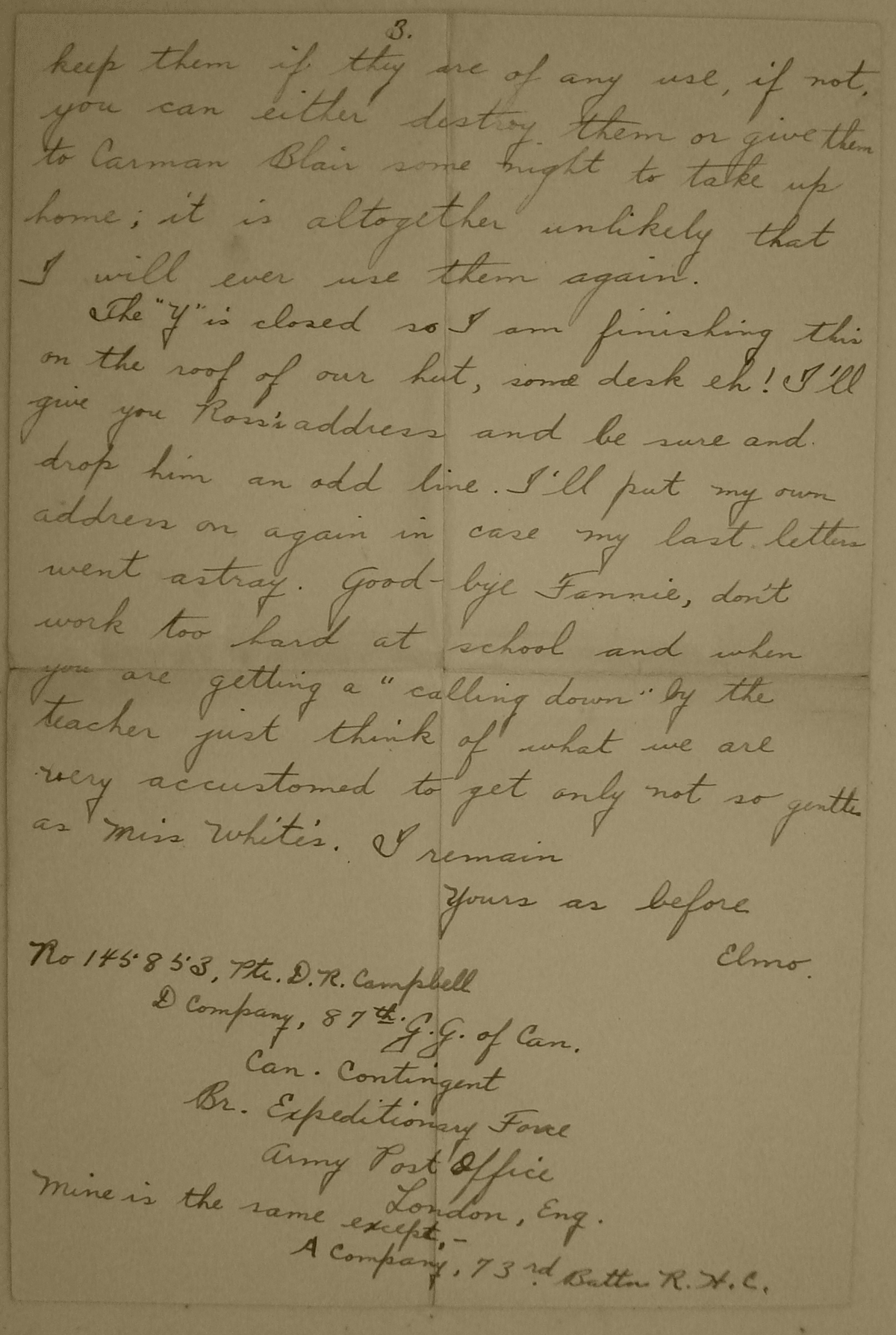
In the third week of August 1916 Elmo goes into the trenches for practical training in trench warfare. Amid all the uncertainty about when the attack will come and where the shells will fall, there is an established routine to manning a trench. During the day, only a few men are on sentry duty, while the others try to rest. Night is the busy time as the men take advantage of the cover of darkness to reinforce the trench defences and spy on the enemy. In between, for an hour at dawn and an hour at dusk, all the men ‘stand to arms’, and peer out over the edge of the trenches, in preparation for any German attack. If no attack comes, before they retire every soldier gets his rum ration – two ounces of 186 proof Jamaican rum! (Another detail the good Baptist Fannie doesn’t need to know.)
After only one tour in the front trenches, Elmo realizes how foolish he was less than a year ago, to be so impatient to leave school for the army. Elmo has had a whiff of his own mortality.
Transcript 1916-08-27
73rd R.H.C.; C.E.F.
12th Brigade, 4th Div.
Army Post Office London Eng.
“Somewhere in France”
Aug. 27, 1916
Dear Fannie,
This is sunday evening and we have just been paid so we naturally feel better than usual. This morning we got back from the trenches about 3 o’clock; we had breakfast at 8.30 then paraded with full pack and marched back here, about five miles. This afternoon we had a parade to the pay-master’s office so you can see how we spent our sunday. I am sitting up here in a Y.M.C.A. writing while you people back in dear old Canada will be going to sunday-school or afternoon service; quite a contrast eh. Imagine! last night while band practise as going on, we were down in those “God-forsaken” trenches dodging bullets and laughing at Death while old Fritz did his best to “get our goat”. During our seven nights in the trenches we had only four casualties in our company. We are back here for a rest, but I suppose that will mean ordinary drill. I believe Ross is up in the trenches yet, until thursday, but don’t say anything about it eh.
Say! wouldn’t I like to be in third form next year? If you compose any more verses be sure and send me a copy. I only wish I could test your cooking, I am sure it would be O.K. I have received your letters fairly regular although the delivery is not very good. Yours of Aug.8 arrived two days ago, so far I have not been lucky enough to get five or six at once from you. Ruby T[hompson]. will certainly cut some dash at normal . I see you are beginning to realize that I wasn’t joking when I told you that I’d like my “high-school life” over again. I am finding more and more that those were glorious years. Do you remember the last skate we had on the rink, we were wondering where we would be this winter and I am still wondering not where I will be but in what circumstances. All I can tell you is “somewhere in France”, as our letters are all censored. Take my advice though and have as good a time as you possibly can; school-days seem very short and sweet after they are over. As to my [school] notes, you can keep them if they are of any use, if not, you can either destroy them or give them to Carman Blair some night to take up home; it is altogether unlikely that I will ever use them again.
The “Y” is closed so I am finishing this on the roof of our hut, some desk eh! I’ll give you Ross’s address and be sure and drop him an odd line. I’ll put my own address on again in case my last letters went astray. Good-by Fannie, don’t work too hard at school and when you are getting a “calling down” by the teacher just think of what we are very accustomed to get only not so gentle as Miss White’s. I remain
Yours as before
Elmo.
No 145853, Pte. D.R. Campbell
D Company, 87th G.G. of Can.
Can. Contingent
Br. Expeditionary Force
Army Post Office
London, Eng.
Mine is the same except,- A Company, 73rd Battn R.H.C.
Part 5, Letter 1, August 27, 1916
What contrast does Elmo highlight for Fannie?
Part 5, Letter 2, September 13, 1916
What evidence is there that Elmo's feelings about the war have now altered?
Part 5, Letter 3, September 16, 1916
Describe a German 'Whiz-Bang’.
Part 5, Letter 5, October 16, 1916
Describe the church service that Elmo attends. How is this church service different from a church service in Metcalfe?
Part 5, Letter 6, October 30, 1916
What message does Elmo have for everyone back home?
Letter 1916-09-13
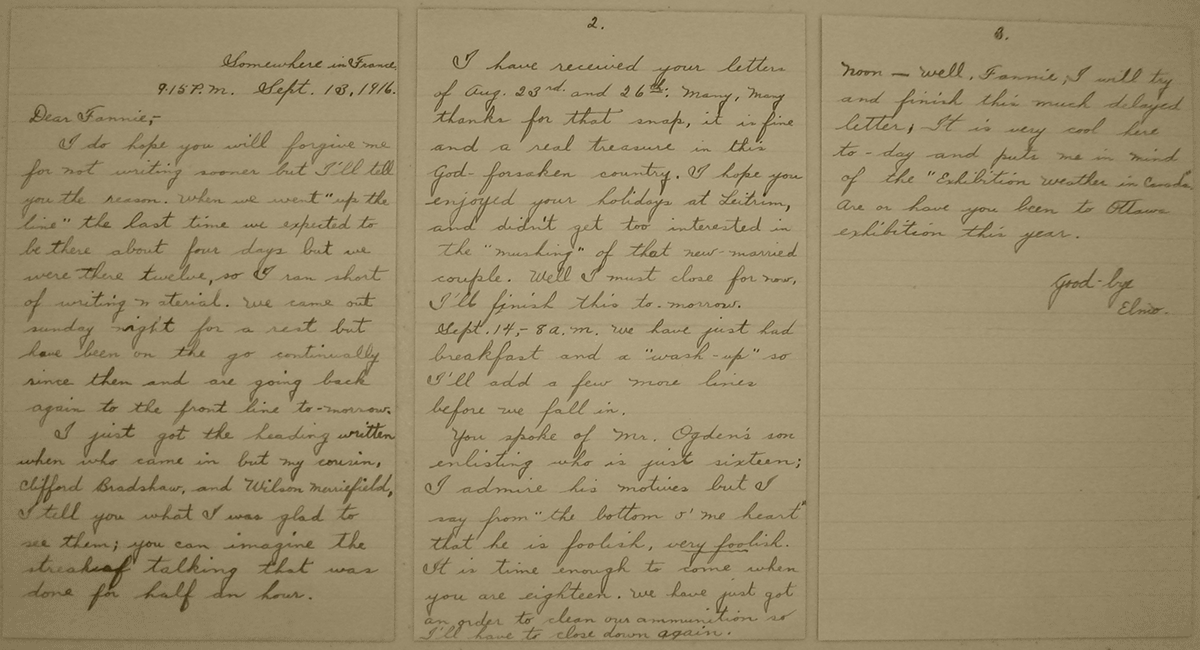
Elmo’s Company has more training at Rossignol. By September 4, 1917 the training is completed and they take control over their own section of the front line trenches. Six days later they come out of the line and move into quarters in Kemmel, a small town south of Ypres.
In Metcalfe, Fannie returns to the Metcalfe Public School, in Form III of the Continuation Class.
On September 14, Elmo is back in the same stretch of front line trenches. September 15 is quiet, but there is a lot of German shelling on the day after.
Elmo makes light of the action. Yet there is something revealing in his backhanded reference to Charlie Goodwillie’s assignment with the Quartermaster Stores. Is Elmo mocking Charlie for being out of range of the shooting, or is he envious?
Transcript Letter
1916-09-13
Elmo’s company has more training at Rossignol. By September 4th, 1917 the training is completed and they take control over their own section of the front line trenches. Six days later they come out of the line and moved into quarters in Kemmel, a small town south of Ypres.
Somewhere in France, 9.15 P.M. [Kemmel Shelters]
Sept.13, 1916
Dear Fannie,
I do hope you will forgive me for not writing sooner but I’ll tell you the reason. When we went “up the line” the last time we expected to be there about four days but we were there twelve, so I ran short of writing material. We came out sunday night for a rest but have been on the go continually since then and are going back again to the front line to-morrow.
I just got the heading written when who came in but my cousin, Clifford Bradshaw, and Wilson Merriefield, I tell you what I was glad to see them; you can imagine the streak of talking that was done for half an hour. I have received your letters of Aug.23rd and 26th. Many, many thanks for that snap, it is fine and a real treasure in this God-foresaken country. I hope you enjoyed your holidays at Leitrim, and didn’t get too interested in the “mushing” of that new-married couple. Well I must close for now, I’ll finish this to-morrow.
Sept. 14 - 8 a.m. We have just had breakfast and a “wash-up” so I’ll add a few more lines before we fall in.
You spoke of Mr. Ogden’s son enlisting who is just sixteen; I admire his motives but I say from “the bottom o’me heart” that he is foolish, very foolish. It is time enough to come when you are eighteen. We have just got an order to clean our ammunition so I’ll have to close down again.
Noon – Well, Fannie, I will try and finish this much delayed letter. It is very cool here to-day and puts me in mind of the “Exhibition Weather in Canada”. Are or have you been to Ottawa exhibition this year.
Good-bye, Elmo.
Letter 1916-09-16
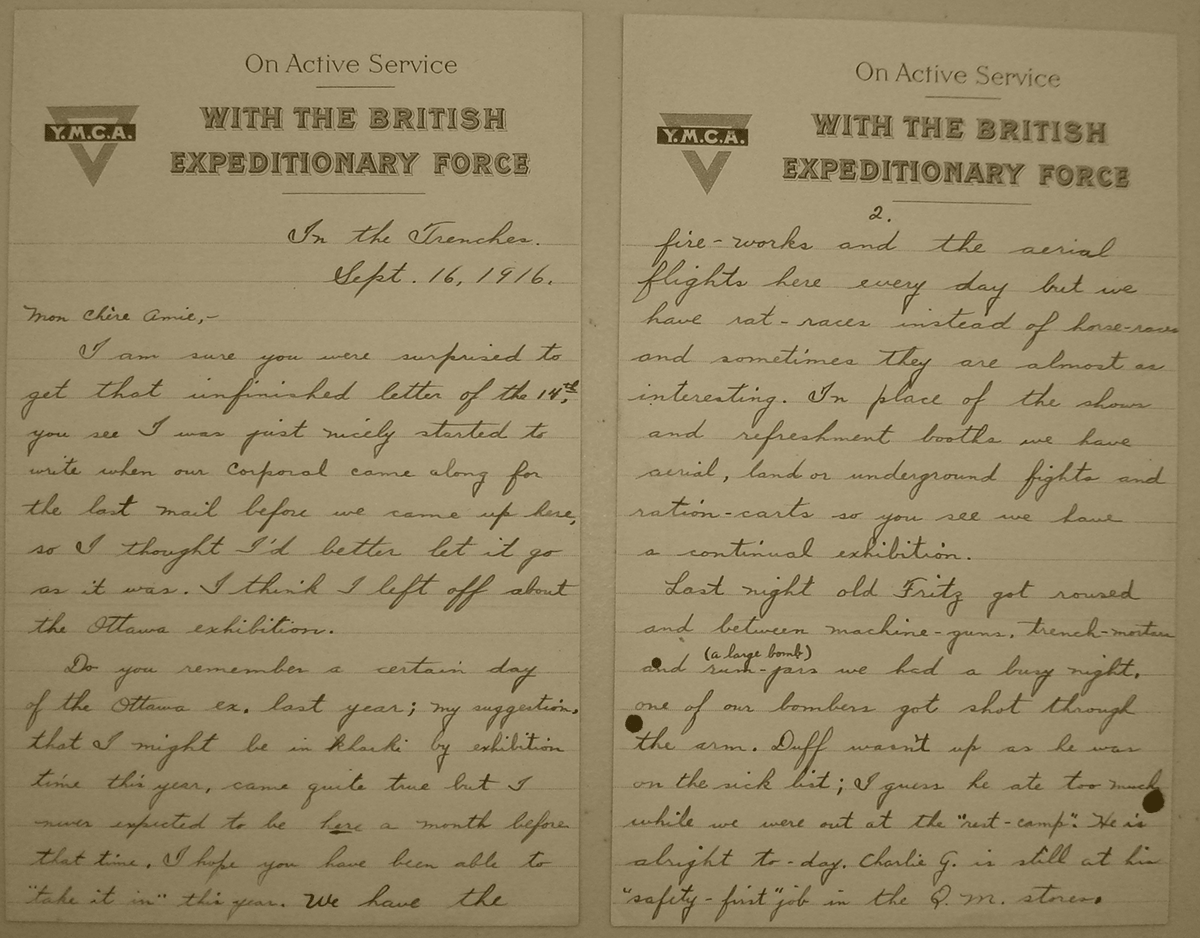
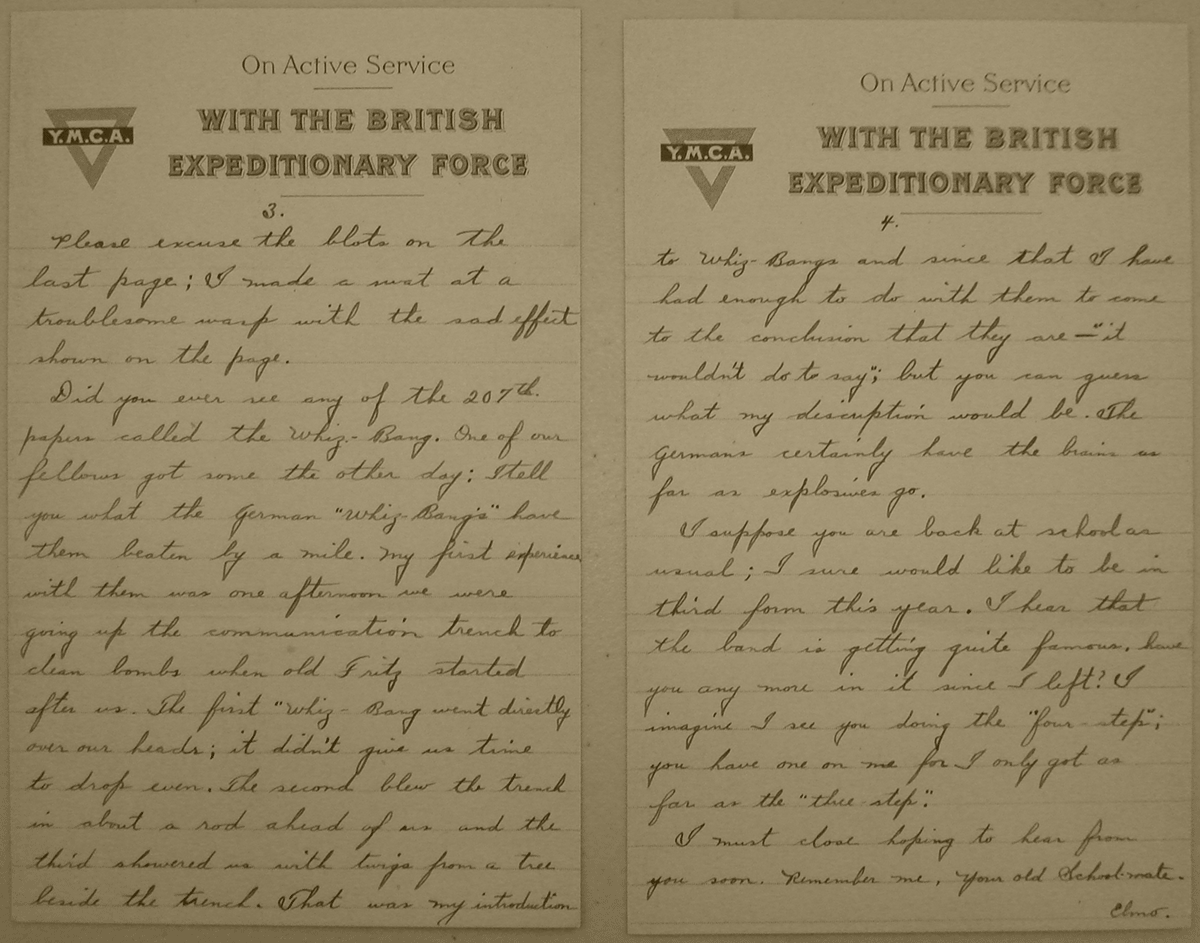
On September 14, Elmo is back in the same stretch of front line trenches. September 15 is quiet, but there is a lot of German shelling on the day after.
Elmo makes light of the action. Yet there is something revealing in his backhanded reference to Charlie Goodwillie’s assignment with the Quartermaster Stores. Is Elmo mocking Charlie for being out of range of the shooting, or is he envious?
Transcript 1916-09-16
On September 14th Elmo is back in the same stretch of front line trenches. The 15th is quiet, but there is a lot of German shelling on the 16th.
In the Trenches.
Sept.16, 1916
Mon Chère Amie,
I am sure you were surprised to get that unfinished letter of the 14th, you see I was just nicely started to write when our Corporal came along for the last mail before we came up here, so I thought I’d better let it go as it was. I think I left off about the Ottawa exhibition.
Do you remember a certain day of the Ottawa ex. last year; my suggestion, that I might be in kharki by exhibition time this year, came quite true but I never expected to be here a month before that time. I hope you have been able to “take it in” this year. We have the fire-works and the aerial flights here every day but we have rat-races instead of horse-races and sometimes they are almost as interesting. In place of the shows and refreshment booths we have aerial, land or underground fights and ration-carts so you see we have a continual exhibition.
Last night old Fritz got roused and between machine-guns, trench mortars and rum-jars (a large bomb) we had a busy night, one of our bombers got shot through the arm. Duff wasn’t up as he was on the sick list; I guess he ate too much while we were out at the “rest-camp”. He is alright to-day. Charlie G[oodwillie] is still at his “safety-first” job in the Q[uarter] M[aster] stores.
Please excuse the blots on the last page; I made a swat at a troublesome wasp with the sad effect shown on the page.
Did you ever see any of the 207th [news]papers called the Whiz-Bang. One of our fellows got some the other day; I tell you what the German “Whiz-Bangs” have them beaten by a mile. My first experience with them was one afternoon we were going up the communication trench to clean bombs when old Fritz started after us. The first “Whiz-Bang” went directly over our heads; it didn’t give us time to drop even. The second blew the trench in about a rod ahead of us and the third showered us with twigs from a tree beside the trench. That was my introduction to Whiz-bangs and since that I have had enough to do with them to come to the conclusion that they are – “it wouldn’t do to say”; but you can guess what my description would be. The Germans certainly have the brains as far as explosives go.
I suppose you are back at school as usual; I sure would like to be in third form this year. I hear that the band is getting quite famous, have you any more in it since I left? I imagine I see you doing the “four-step”; you have one on me for I only got as far as the “three-step”.
I must close hoping to hear from you soon. Remember me, your old school-mate.
Elmo
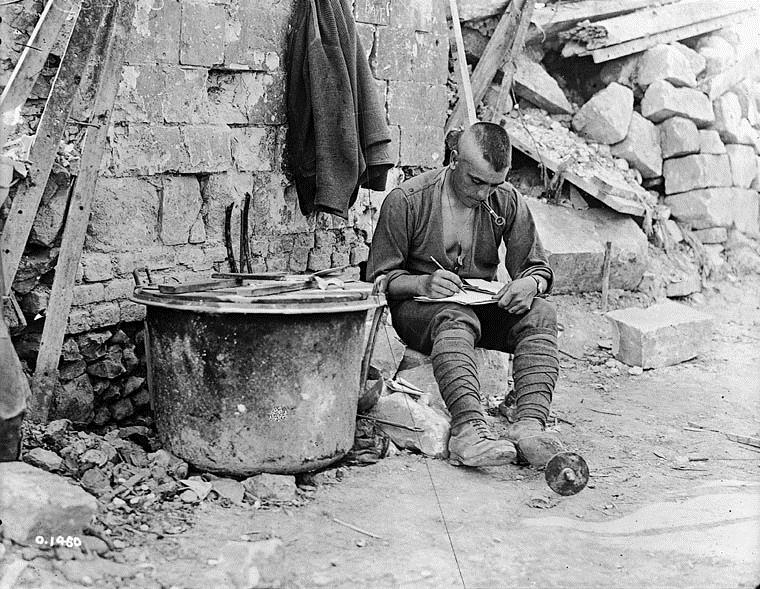
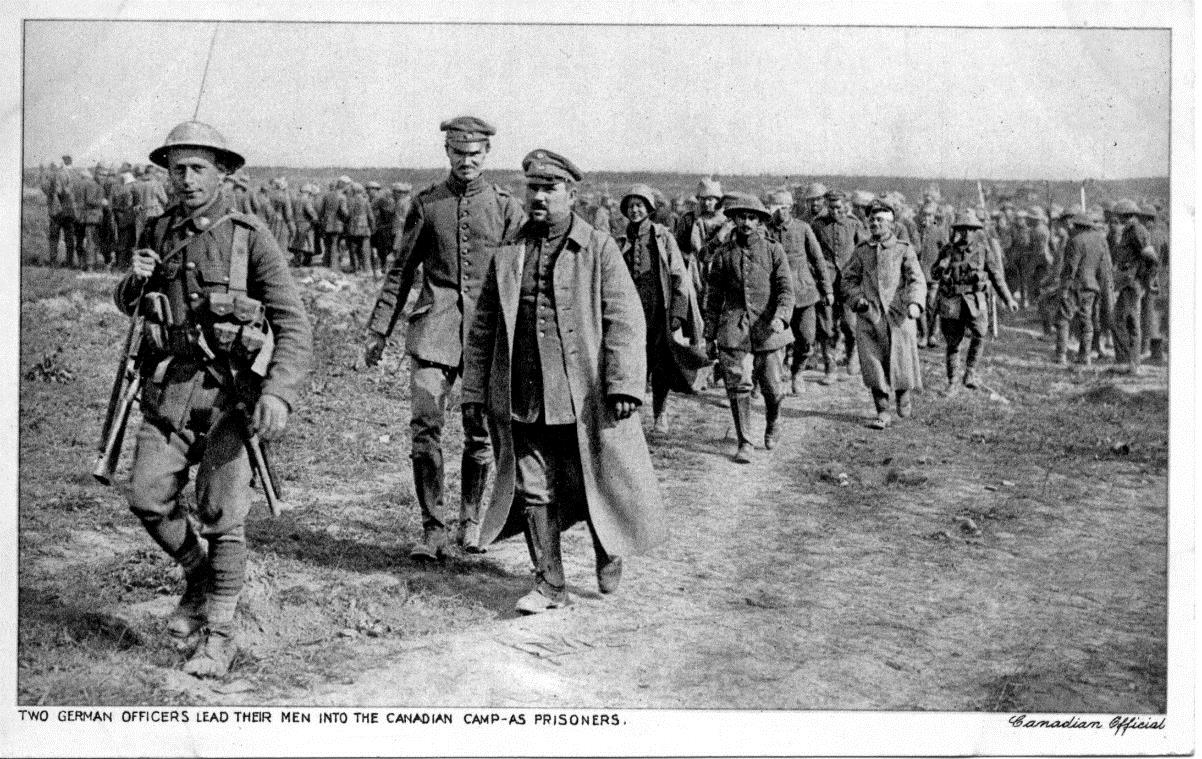
The shelling continues until September 20, 1917. On September 23, the 73rd Battalion leaves the trenches at Kemmel. Elmo begins marching. They march and they camp. Through Locre, then forty miles to Hazebroucq. And fifty miles to Arques. Then seven more miles brings them to Hellebroucq on September 26. Here they are billeted with Flemish farmers – a fleeting taste of home for farm boys like Elmo and Duff. And they begin intensive training for their next big assignment – the fighting at the Somme.
The Battle of the Somme has been going on since July, along an eighteen mile section of the Western Front. The roar of the guns rarely lets up. It is a massive human meat grinder, mixing up soldiers and artillery, and churning out mud, wounded men and corpses. By the time the fighting draws to a halt in mid-November, the battle will have cost the Germans 650,000 men, the French 195,000 and the British 420,000 men – 24,000 of whom are Canadians – 8,000 dead and 16,000 missing or wounded.
On October 3 Elmo’s battalion takes a train south from Arques to Beauval. From Beauval they march again, five miles to Bonneville. Then twelve miles to Toutencourt. Their sodden kilts swinging in the rain. Damp boots heavy with mud. On October 9, they reach Warloy-Baillon.
Elmo and Duff have been assigned to a bombing platoon – a specialist unit of men who pitch the recently introduced hand grenades. ‘Bombers’ are chosen for having a strong arm which can chuck a grenade a decent distance with reasonable accuracy – an arm like a farm lad would have. The job is dangerous. The bomber has to get within throwing distance of the enemy. And then it is almost impossible to hurl the grenade further away than the bomb fragments will fly back. The bomber has to take cover in the brief seconds before his grenade explodes, or he will become a casualty of his own weapon.
Transcript Letter
1916-10-09
[Warloy-Baillon, France]
Oct. 9, 1916
Dear Fannie
Well, how is school going this weather [sic]. Are you getting accustomed to the third form work yet? I sincerely sympathize with you for being alone in the French classes; but if you ever land in this ---- country you will be mighty glad you didn’t give it up.
I got your snap some time ago and wrote immediately telling you so but it must have gone astray. Many thanks for the snap it is a treasure over here. I am glad the band is getting along so well, I guess your Dad will find Lorne [Carson] of more value to the band than I ever thought of being.
Our mail is very uncertain since we started moving, I just got your letter of Sept. 15 yesterday. It is quite true that Duff is “hand grenading”. I am at the same job myself. We are bombers now and experiment with hand-bombs, grenades, etc. instead of alcohol lamps or gasoline. It is almost as interesting and quite as risky as our third form experiments in chemistry. It is also true that Charlie G. has a (as Ross says) bomb proof job in the Q[uarter] M[aster] stores handling supplies. I see Alfred Goodwin quite often now, he is fine and just the same as when he was at Simpson’s .
I was down to the 87th lines last and saw Ross. We had a great chat for about an hour, he is just the same old Ross. I think he is a little fleshier if anything and is just as cheerful as ever. He has taken a short course in first aid so he has one on me.
Well I must close as it is almost time to fall in. I hope you don’t stop writing because I don’t answer every letter because we are in very difficult positions sometimes, at present I am in an old shed writing with my pad on my knees. Don’t be discouraged with the school work, it will get easier as the year goes on.
Your Sincere Friend,
Elmo
Elmo writes a letter to Fannie’s sister Sadie, who was his teacher the previous year and is now teaching in Maxville, Ontario. He has seen some German prisoners and is surprised by their appearance.
Transcript (Letter 2)
1916-10-09
Elmo writes a letter to Fannie’s sister Sadie, who was his teacher the previous year and is now teaching in Maxville, Ontario. He has seen some German prisoners and is surprised by their appearance.
Oct. 9, 1916.
Dear Miss [Sadie] Iveson,
Received your welcome card yesterday and was sure glad to hear from you; I almost thought I was forgotten. We have very little time to write here but are none the less glad to get letters.
Charlie Goodwillie is fine: he has, what we call, a bomb-proof job in the Q.M. stores handling supplies. Duff and I are in the Battalion Bombers and have quite an interesting time.
I was down to see Ross last night; the first time I saw him since we left Blighty. He is just the same as ever and seems to be toughing this life wonderful for his size. He certainly deserves credit if anyone does; it makes me ashamed of myself when I feel “done up” to think of him sticking it out without a word of complaint. I’ll put his address at the end of the letter and I am sure he will be delighted to hear from you. He was telling me yesterday that he had several letters not answered but that it was almost impossible to get writing. You know we haven’t a nice table to write on now; at present I am writing in an old French shed with my pad on my knee.
I believe you would be inclined to laugh if you should happen to see me with my “dress” on; just imagine me in short skirts, bare knees and a tam-o-shanter on my dome. I am a sight but Charlie G. might be described as a “Scene” all by himself. Duff of course has the same outfit and is about as odd-looking as the rest of us. The Germans have named the Kilties “the women from hell” so we have quite a reputation to keep up.
Believe me some of the German prisoners certainly look as if they came from the lower regions but others are only kids like ourselves. Say Miss Iveson did you know a young fellow by the name of Cotton; he is in our platoon and said he was in Maxville last winter and met a Miss Iveson who was a very fancy skater. I concluded from the last part of the sentence that it must have been you.
I suppose you are quite busy with your school; Ross and I got our normal Entrance certificates and expect to get our Matric[ulation certificates] but haven’t heard of it yet. You should hear your old pupils talking French over here, it is quite a problem but the french lessons we had at M[etcalfe] C[ontinuation] S[chool] come in very handy. I believe I will learn to speak french if both myself and the war last long enough. Ross says he can make them understand when he wants to buy a meal but more than that he don’t bother with them.
You must be tired reading this trash so I’ll “wind up” for this time. I’ll be glad to get a line from you any time but I may not be able to answer as we are in difficult positions sometimes. I remain
Your absent Pupil
Elmo
P.S. My address is slightly changed.
No.145855, Pte. E.A. Sully
Bombing Platoon
73rd. R.H.C.; B.C.F
Army P.O., London, Eng
1916-10-16
The Somme Battlefield
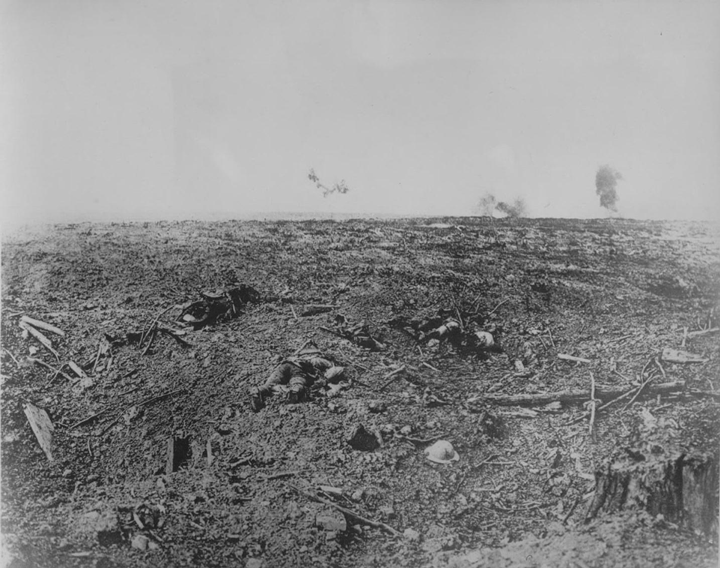
Training continues. October 12, 1917, the Battalion marches forward seven miles through the ruins of Albert to Tara Hill where they camp in a muddy field. Here they wait in reserve for two weeks for their turn in the front lines of the Battle of the Somme. Around them a barren landscape runs to the horizon, endless mud and shell holes. Not a spot of green in sight. They send daily working parties to the trenches. Not everyone comes back.
Transcript Letter
1916-10-16
[Tara Hill, France]
Oct. 16, 1916
Dear Fannie,
I was delighted to get your letters of 21st and 23rd the other night just before I went “up the line”. We have quit shifting around for a while and are at the “dirty work” again.
I will be looking forward for one of those snaps you got taken; you will have my letters before this saying I got your other one. I am afraid Miss White will be shocked many times if that little word “Jove” affected her. Gee! wouldn’t I like to be “beating it up to the little church upon the hill” with you; but that is an impossibility, I’ll describe our service later. I hope your cold is better and that you are not working too hard at school. The girls sure did well at selling tags, I suppose “Jess” feels about two inches taller.
I am going to describe to you yesterday (sunday) and our doings. We arose at the usual time, detonated about three thousand bombs which took till about 10.30. Then we had an open-air service followed by dinner. In the afternoon we had a pay-parade and got another fifteen francs, then the bunch was picked out to go “up the line” but I was lucky and was left behind so Duff and I went to the Y.M.C.A. This is a description of our easiest sunday since coming to France. Now I will describe our service.
I must mention that this was the fourth service I have attended since I left Canada so you see how busy we have been kept. For a church we sat in the form of a square on the ground and in the centre stood a biscuit box from which pulpit our preacher gave us a few words of advise. Our piano was substituted by the brigade band and the minister’s remarks were punctuated by the reports of the artillery which hammers the Huns day and night here. All through the service aeroplanes sailed back and forth continually, like large hawks circling over their prey; and on all sides of the little gathering, were troops of all kinds camping in the open fields. Quite a difference from the service in the quiet little town of Metcalfe eh.
I saw Ross last thursday night, he is fine and is just the same old sport. I also met Clifford Bradshaw, my cousin, and intended to go across and see Wilson Merriefield the next night but unfortunately I had to go “up the line”. I haven’t seen Alfred G. for about a week. Now I am sure you are tired reading this trash so I’ll close for now, hoping you are enjoying the best of health and not taking Miss White’s shocked looks too hard.
I remain
Yours as before
Elmo
P.S. Did you hear that Duff met his brother; he looks fine for being here so long.
E.A.S.
Blackwatch Moving to the Front
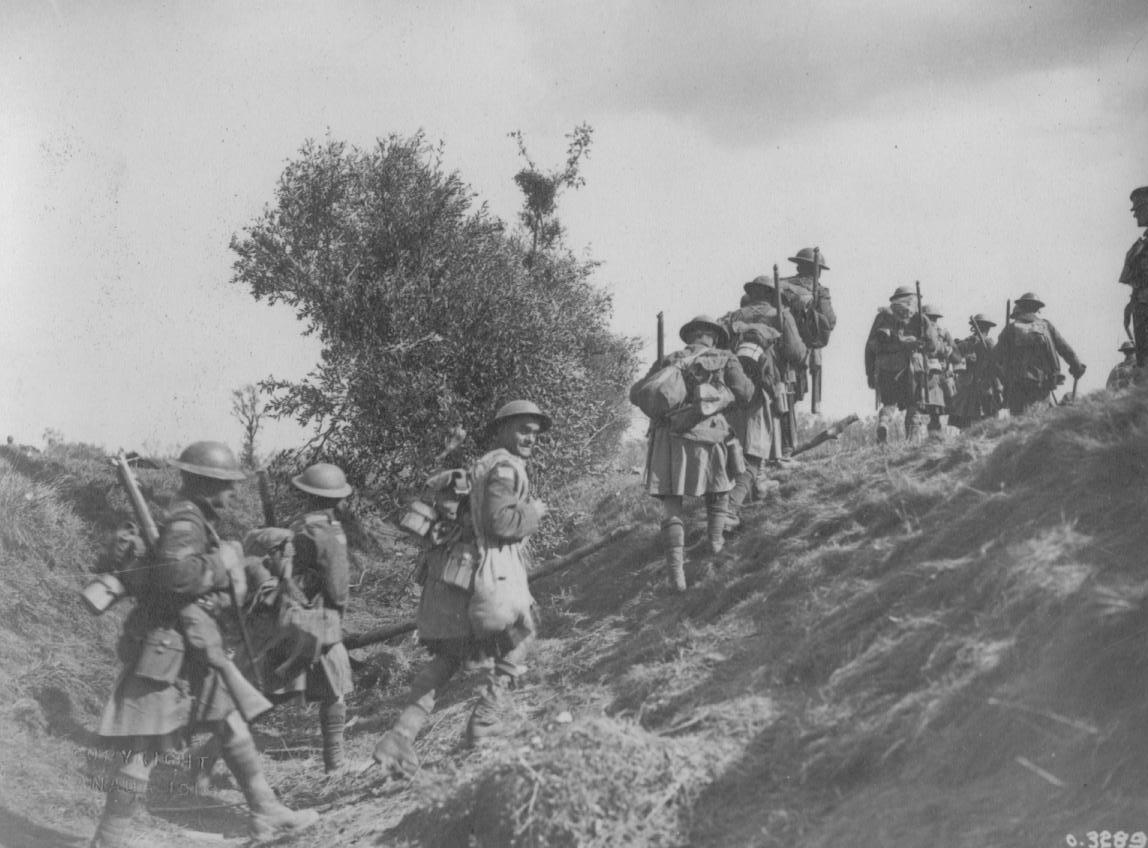
Letter 1916-10-30
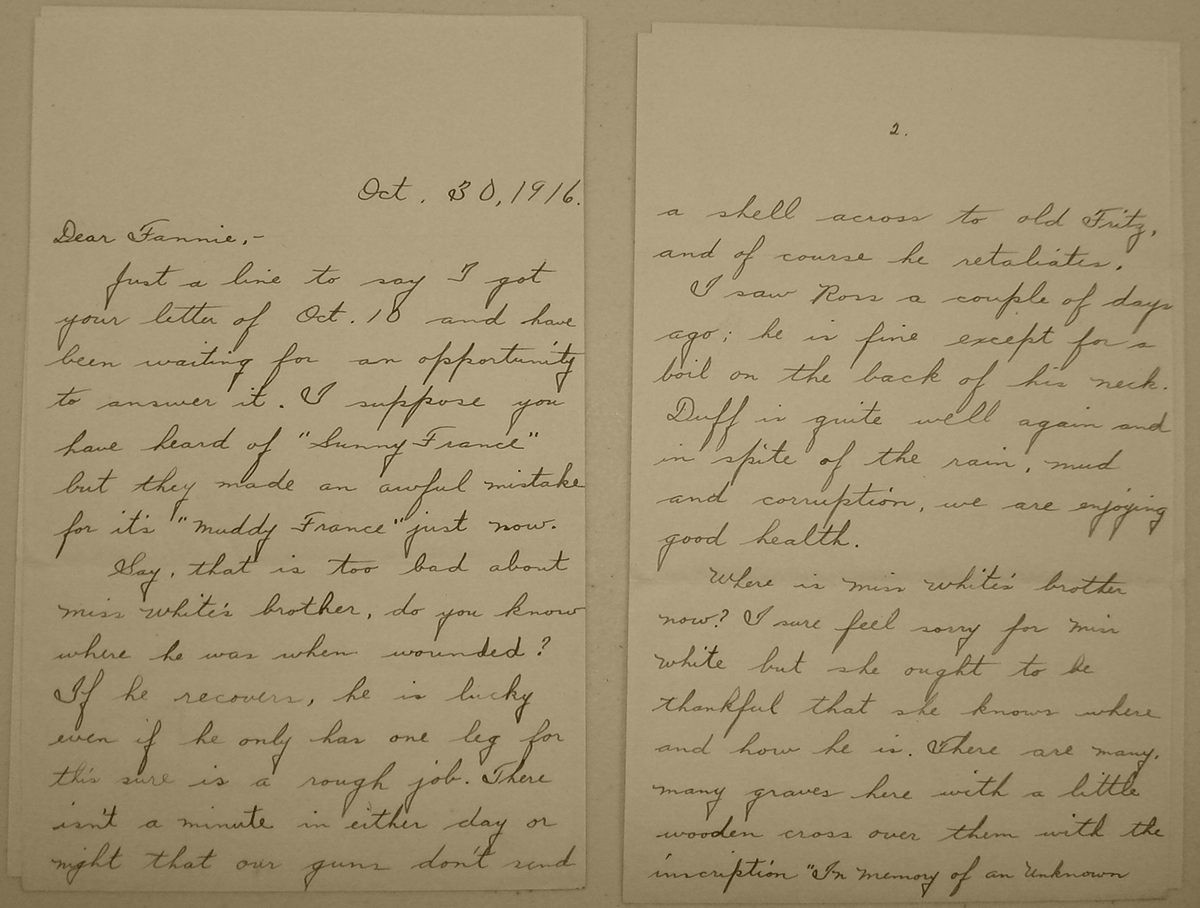
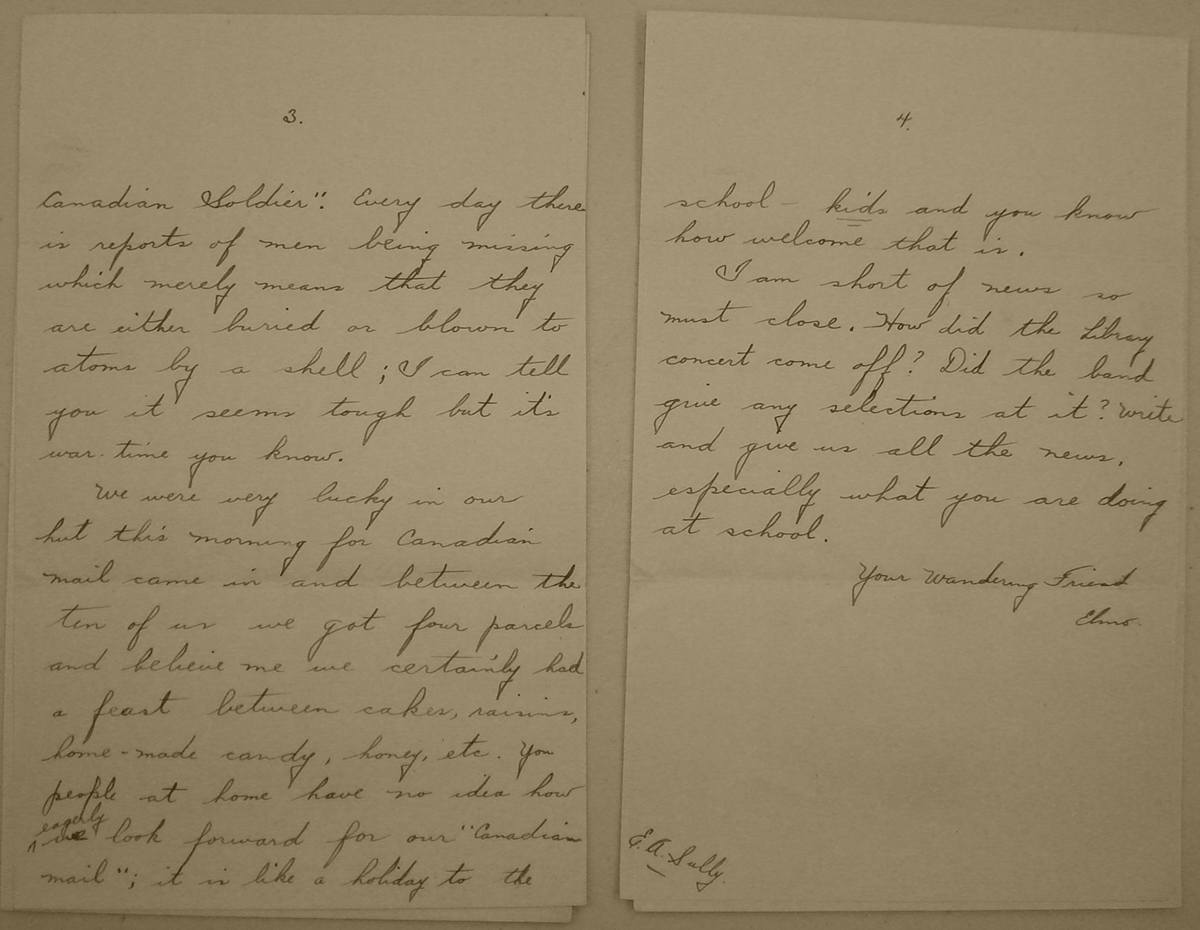
The soldiers dig their tent sites deeper. They scavenge for blankets – some sleep under their greatcoats. If they can get dry and warm, they take off their shirts and search for lice, then flip them into the candle flame one by one. October 24, they exchange their kilts for trousers.
On October 26, the Battalion moves from Tara Hill to an equally muddy field nearer the line, named Sausage Field. On the night of October 29, they move forward and take over a section of the front line. The shelling doesn’t let up. Nor the rain. Mud and water rises in the bottom of the trenches. Eight of Elmo’s fellow soldiers die and forty-three are wounded.
Sweet Fannie, innocent at her desk in Metcalfe, doesn’t need to know all this.
Transcript Letter
1916-10-30
Oct. 30, 1916
Dear Fannie,
Just a line to say I got your letter of Oct. 10 and have been waiting for an opportunity to answer it. I suppose you have heard of “Sunny France” but they made an awful mistake for its “Muddy France” just now.
Say, that is too bad about Miss White’s brother , do you know where he was when wounded? If he recovers, he is lucky even if he only has one leg for this sure is a rough job. There isn’t a minute in either day or night that our guns don’t send a shell across to old Fritz, and of course he retaliates.
I saw Ross a couple of days ago; he is fine except for a boil on the back of his neck. Duff is quite well again in spite of the rain, mud and corruption, we are enjoying good health.
Where is Miss White’s brother now? I sure feel sorry for Miss White but she ought to be thankful that she knows where and how he is. There are many, many graves here with a little wooden cross over them with the inscription “In Memory of an Unknown Canadian Soldier”. Every day there is reports of men being missing which merely means that they are either buried or blown to atoms by a shell; I can tell you it seems tough but it’s war-time you know.
We were very lucky in our hut this morning for Canadian mail came in and between the ten of us we got four parcels and believe me we certainly had a feast between cakes, raisins, home-made candy, honey, etc. You people at home have no idea how eagerly we look forward for our “Canadian mail”, it is like a holiday to the school kids and you know how welcome that is.
I am short of news so must close. How did the library concert come off? Did the band give any selections at it? Write and give us all the new, especially what you are doing at school.
Your Wandering Friend
Elmo
Letter 1916-11-05
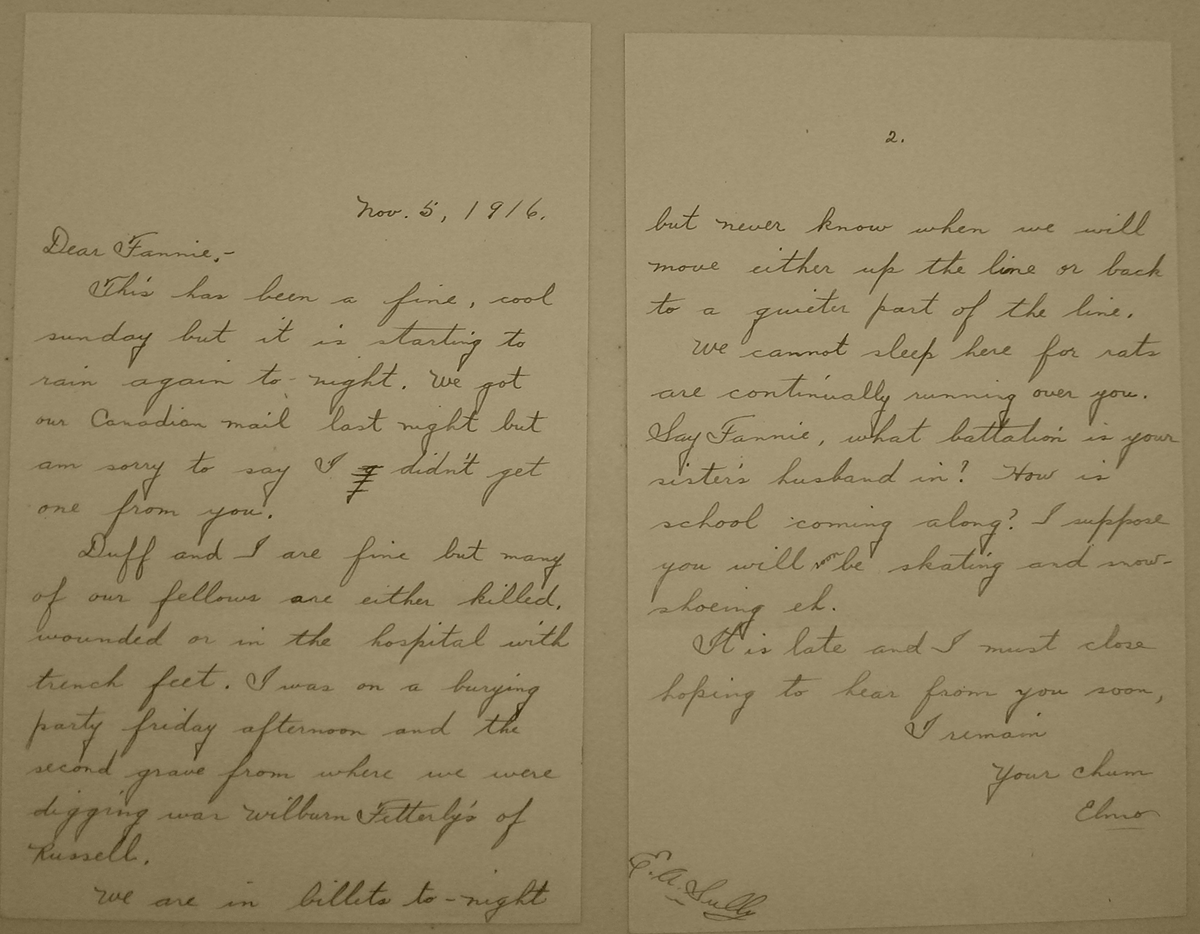
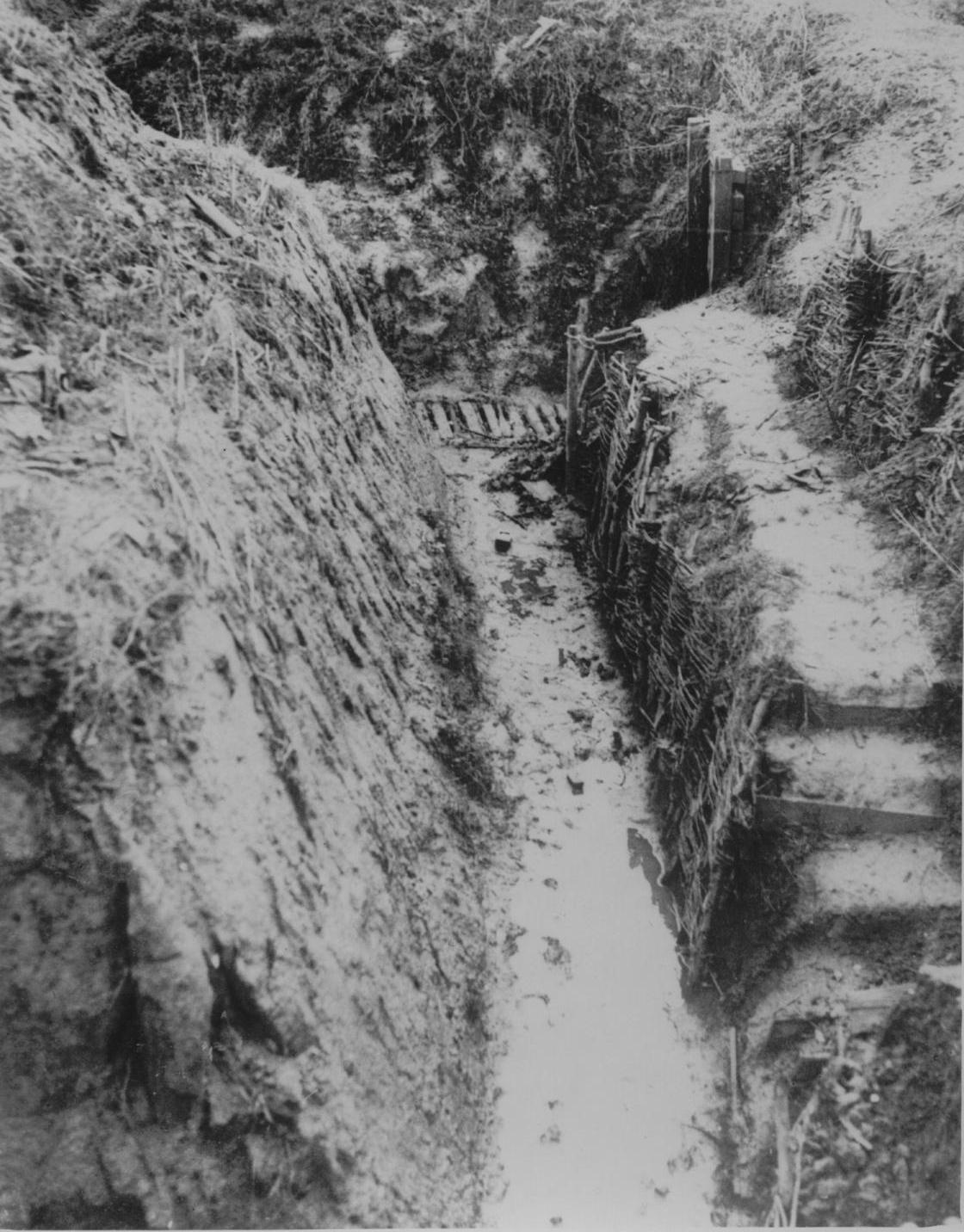
After four days of standing in mud and water, the Battalion comes out of the line, back to the camp at Tara Hill on November 3, and then on to billets in Bouzincourt by November 4. A day later Elmo gets his first bath in three weeks.
November 6,1917, Elmo’s Battalion begin training for a planned attack. November 11, Elmo’s Battalion moves forward to take over Regina Trench, captured from the Germans the night before. They spend November 12 digging new trench defences for an expected counterattack.
The afternoon of November 13, the line is shelled heavily by the Germans. Elmo moves forward with the men. He starts across a gap where a shell has damaged the fortifications. He feels a sudden blow across his forehead. He blacks out. When he comes to, his face is bleeding. Roughly bandaged, he makes his way back from the battlefield to a dressing station. Waiting for transport he sends a battlefield post card to Fannie.
Transcript Letter
1916-11-05
Nov. 5, 1916
Dear Fannie,
This has been a fine, cool sunday but it is starting to rain again to-night. We got our Canadian mail last night but am sorry to say I didn’t get one from you.
Duff and I are fine but many of our fellows are either killed, wounded or in the hospital with trench feet . I was on a burying party friday afternoon and the second grave from where we were digging was Wilburn Fetterly’s of Russell.
We are in billets to-night but never know when we will move either up the line or back to a quieter part of the line.
We cannot sleep here for rats are continually running over you. Say Fannie, what battalion is your sister’s husband in? How is school coming along? I suppose you will soon be skating and snow-shoeing eh.
It is late and I must close hoping to hear from you soon,
I remain
Your Chum
Elmo
Elmo Gets Wounded
November 6,1917, Elmo’s Battalion begin training for a planned attack. November 11, Elmo’s Battalion moves forward to take over Regina Trench, captured from the Germans the night before. They spend November 12 digging new trench defences for an expected counterattack.
The afternoon of November 13, the line is shelled heavily by the Germans. Elmo moves forward with the men. He starts across a gap where a shell has damaged the fortifications. He feels a sudden blow across his forehead. He blacks out. When he comes to, his face is bleeding. Roughly bandaged, he makes his way back from the battlefield to a dressing station. Waiting for transport he sends a battlefield post card to Fannie.
